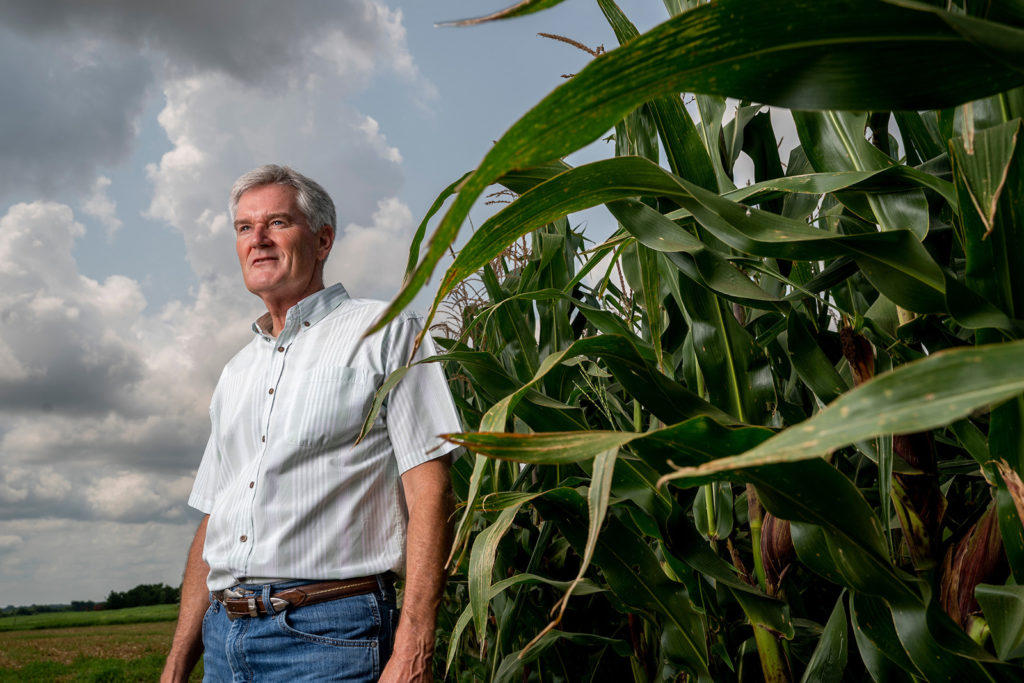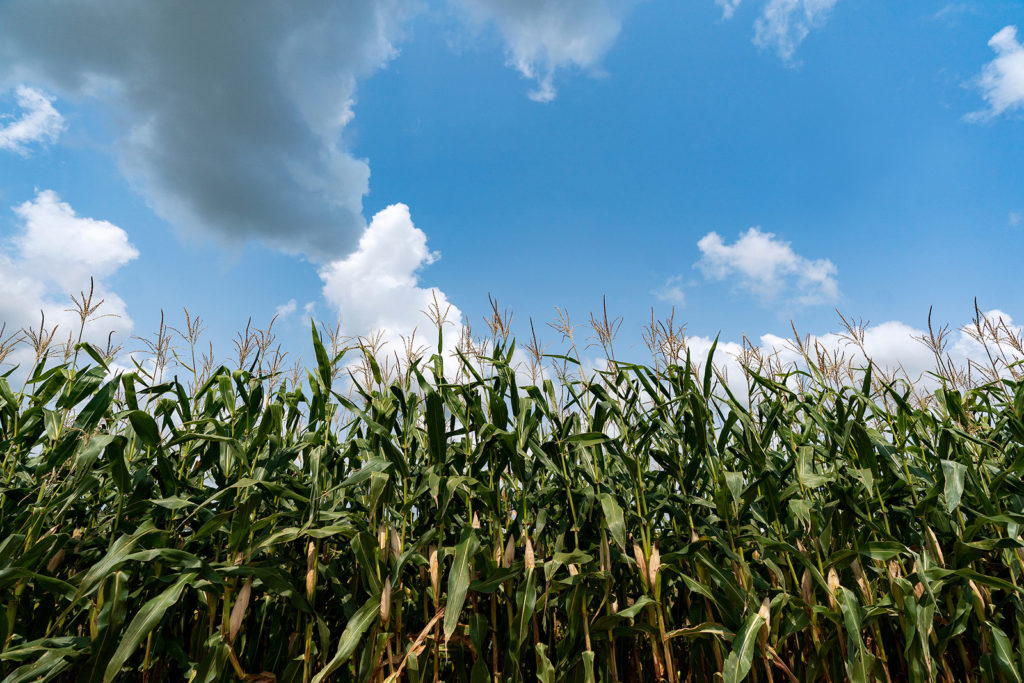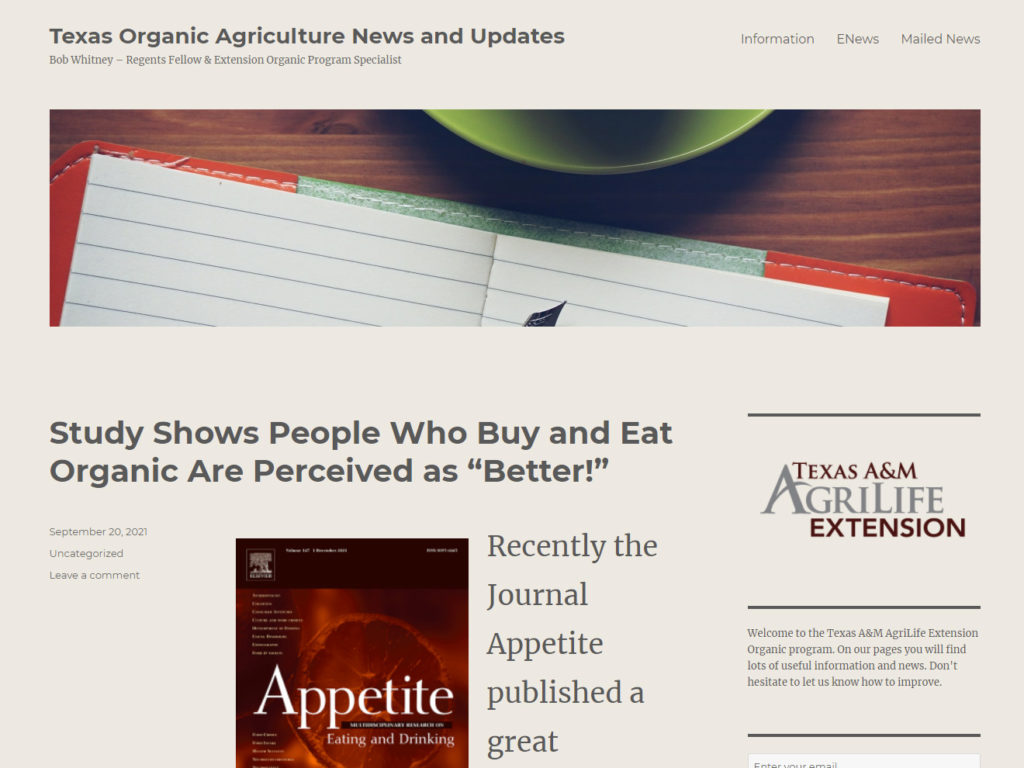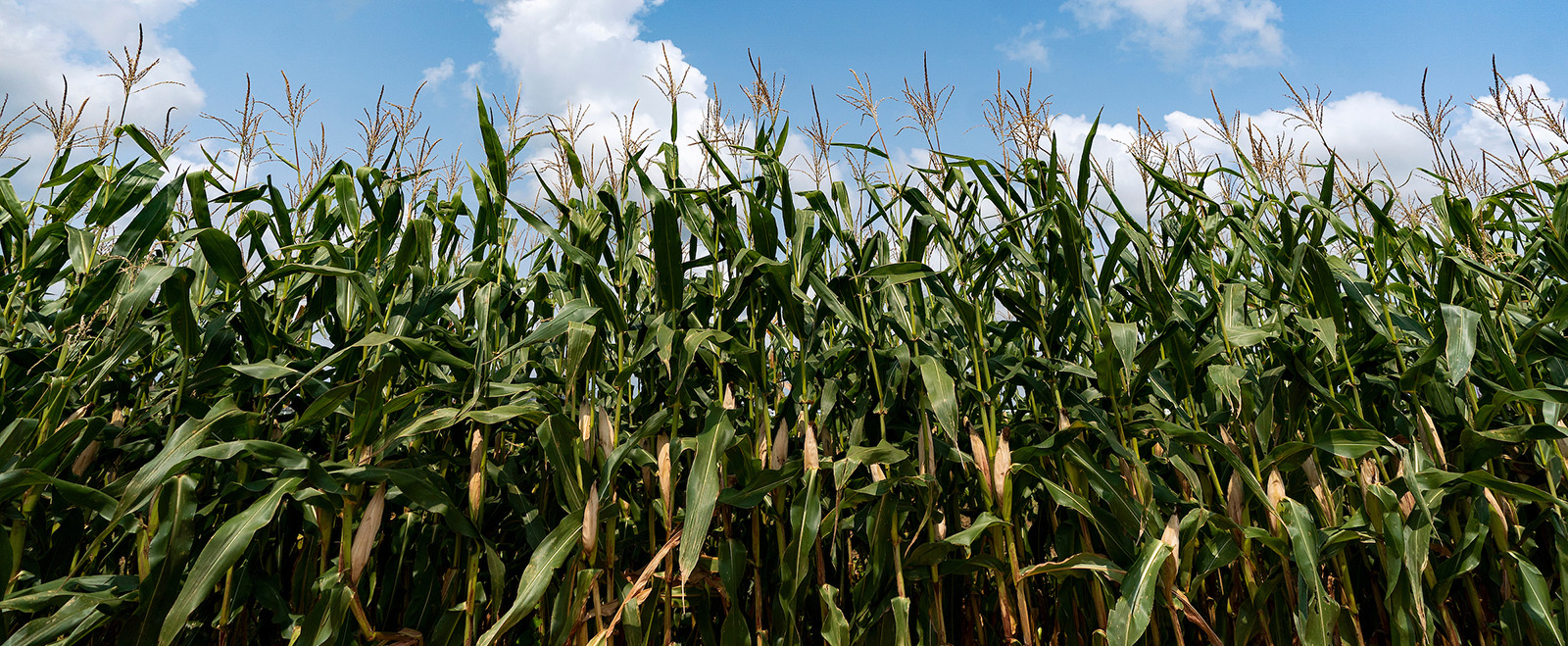
Bob Whitney, Texas A&M AgriLife Extension Service state organics specialist, in organic corn field at Stephenville (Sam Craft/Texas A&M AgriLife Marketing and Communications)
Current estimates show that Texas has taken 3rd place in the U.S. for organic agriculture acres and value. Over 246,000 organic acres produce agricultural commodities on 360 organic farms across the state.
The economic impact of organic grains, cotton, oilseeds, vegetables, fruits and other organic crops is about $241.7 million annually. Meanwhile, Texas organic livestock and poultry sales are estimated at $75.3 million annually, and organically produced livestock products like milk and eggs contribute an additional $621.9 million in total output. These organic sales contributed to $938.9 million in total output, $377.4 million in value added, $247.6 million in labor income, and about 8,320 full- and part-time jobs across the Texas economy.
Texas organic production has continued to increase, and the number of organic producers has more than doubled since 2016.
A total of 386 organic producer entities represent 360 farms with over 300,000 acres in 79 out of 254 Texas counties. The major organic commodities produced in Texas are peanuts, cotton, rice, wheat, milo, corn and dairy. Producers are geographically scattered across the state, but the region spanning Seminole in the South Plains up to Dalhart in the Panhandle encompasses a large concentration of organic producers.
More than 400 organic buyers in Texas, known as “handlers,” purchase raw organic commodities and add value to wholesome consumer goods sold all over the world.
Organic Agriculture and AgriLife Extension

Texas A&M AgriLife Research and Extension Center at Stephenville (Laura McKenzie/Texas A&M AgriLife Marketing and Communications)
Organic agriculture is big business in Texas and a big part of the scope of Texas A&M AgriLife Research and the Texas A&M AgriLife Extension Service.
Bob Whitney is AgriLife Extension’s first-ever state organic program specialist, enlisted to work across Texas with organic producers and buyers.
Located at the Texas A&M AgriLife Research and Extension Center at Stephenville, Whitney has worn many agricultural “hats” across AgriLife Extension and AgriLife Research over a nearly three decades. He has worked in a variety of settings that have included long-term international assignments abroad. He contributes a lifetime of experience with commercial agriculture in Texas and throughout many countries of the world where has worked to develop agricultural systems, largely in subsistence agriculture.
As AgriLife Extension’s state organic program specialist, Whitney guides individuals and entities seeking organic certification. His teachings include technical assistance on organic agriculture production for clientele, and he serves as a liaison connecting organic operators to other AgriLife Extension and AgriLife Research scientists.
Texas organics blog

A blog curated by Whitney covers news and updates related to organics across Texas. The Texas organics blog is available at https://agrilifeorganic.org
Organic agriculture and AgriLife Research
The Stephenville Center is one of four AgriLife centers that are USDA organic certified. The others are at Lubbock, Vernon and Uvalde. The Texas A&M AgriLife Center at Vernon also houses a 99-acre research farm that is in transition to becoming certified organic.
These organic certified research facilities breed new organic varieties of peanuts, cotton, milo, vegetables, corn, wheat, forage crops and specialty crops like cowpeas, guar, and hemp.
Waltram Ravelombola, Ph.D., AgriLife Research organic specialty crop breeder, is now located at the Vernon center, where he conducts numerous organic projects in process and grant applications for many more.
In addition to Ravelombola, research and extension faculty working to build the state’s organic agriculture sector across Texas A&M AgriLife include:
- Curtis Adams, Ph.D., assistant professor
- Juan Anciso, Ph.D., professor and extension vegetable specialist
- John Cason, Ph.D., assistant professor
- Jane Dever, Ph.D., professor
- Emi Kimura, Ph.D., assistant professor and extension agronomist
- Fugen Dou, Ph.D., associate professor
- Jourdan Bell, Ph.D., assistant professor and extension agronomist
- Katie Lewis, Ph.D., associate professor
- Luis Ribera, Ph.D., associate professor and extension economist
- Samuel D. Zapata, Ph.D., assistant professor and extension economist
- Francisco “Pancho” Abello, Ph.D., assistant professor and extension specialist
- Peter Dotray, Ph.D., professor and extension specialist
- Reagan Noland, Ph.D., assistant professor and extension agronomist
- Ronnie W. Schnell, Ph.D., associate professor and extension specialist
- Russell Wallace, Ph.D., professor and extension vegetable specialist
- Xin-Gen “Shane” Zhou, Ph.D., associate professor
- Vijay Joshi, Ph.D., assistant professor
